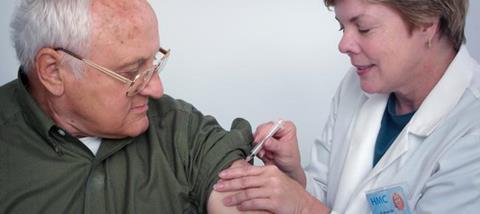
On 2 December the UK Medicines and Healthcare products Regulatory Authority (MHRA) gave approval for the Pfizer/BioNtech vaccine to be employed in the UK, and since then the Oxford-AstraZeneca vaccine has also been approved.
The genetic sequence of the Covid-19 virus was only determined at the end of January 2020, so the extraordinary scientific achievement of creating, testing and approving three completely new vaccines in less than a year is astonishing, and to use an over-worked word, unprecedented. Probably the closest comparison for speed would be the development of a new vaccine for the lethal Ebola virus which took six years.
From a Christian perspective we can give thanks that God has given us the scientific knowledge, the human expertise and motivation and the resources to undertake this massive enterprise for the good of humankind. There’s little doubt that the entire field of vaccine development has been transformed for good because of the Covid-19 pandemic. As an example, the Oxford University team is starting clinical testing in Africa of a promising new malaria vaccine, which has the potential to save literally hundreds of thousands of children’s lives every year.
Despite the incredible breakthroughs, however, some Christians remain reticent about vaccination. As a medical professional my aim is to provide accurate and relevant information to enable Christians to come to their own conclusions:
Q: Have the new vaccines been developed using tissue from aborted foetuses?
Both of the new coronavirus vaccines, as part of their development processes, made use of what biotechnologists have termed ‘immortal cell lines’. These are cultures of cells which keep multiplying indefinitely.
The cell line called HEK-293, which was initially derived using tissue from a single foetus who was legally aborted in the Netherlands in the 1970s, was used in the production of the Oxford-AstraZeneca vaccine, while the Pfizer and Moderna vaccines employed these cells for testing purposes.
It’s important to understand that the original tragic abortion carried out in the 1970s was not carried out for scientific research, and no further abortions have been undertaken since as part of the vaccine development. HEK-293 cells have been used in the development of a number of other medical drugs in common use including some types of influenza vaccines and cancer treatments.
But how should Christians who wish to show respect for all human life before and after birth respond to this? How do we balance the large numbers of lives that would be saved by an effective vaccine for Covid-19 against ethical concerns about how it has been developed?
In brief, I think it’s helpful to see this issue in the light of a wider category of moral dilemmas which Christians have struggled with for centuries. It has often been called the question of ‘cooperation in evil’ or ‘cooperation with evil’. It’s a recognition that by our very engagement in human society in a fallen world we cannot avoid some degree of cooperation or complicity with evil.
Some of the money that I pay to the UK Government in taxes is used for purposes with which I profoundly disagree, for example. Even Jesus himself, by encouraging people to pay their taxes to Caesar, and by eating at the house of Zacchaeus the tax collector, was in some sense cooperating with the very obvious evils of the Roman Empire.
Moral theologians who have wrestled with these problems have drawn distinctions between intentional and non-intentional cooperation, between active and passive cooperation and between proximate (or physically close) cooperation and remote cooperation. They have also stressed the importance of looking for alternatives to the evil and trying to balance the cooperation with evil against the morally good things that may result. Since the coronavirus has already been responsible for more than 2 million deaths across the world, the argument based on the urgency of saving future lives is very strong.
Each of us has the right of conscience as we struggle to do what is good in a complex and fallen world. But speaking personally, while I do not wish in any way to downplay the seriousness of abortion, I see a duty of Christian love to be vaccinated, not only to minimise the possibility of becoming seriously ill, but in order to protect so many precious lives that are risk.
Q: Should we accept a vaccine that is ‘morally tainted’?
How should we think about the vaccines for Covid-19? First, it makes a difference what role we play in the story. For instance, consider the ethical challenges for a Christian technologist working in a vaccine lab, or for a Christian pharmaceutical company executive making decisions about which vaccine candidates to invest in, or a Christian politician with responsibilities for public spending. Their ethical responsibilities are obviously different from those of a person with vulnerable elderly relatives who has no connection with the healthcare world.
Clearly, if I have a chance to influence decisions for good and away from evil then I have a responsibility to do so. If I can’t influence the decision, then, for example as a Christian working in a biotech lab, I may choose not to work on a particular cell line, or even resign from my job if I have no alternative.
But as someone who is caring for vulnerable elderly people I may feel that it is better for me to accept vaccination even if the vaccine is ‘morally tainted’, because the alternative of passing on the virus is worse. Similarly, if I wish to have the privilege of travelling internationally I may have to accept vaccination to prevent inadvertently spreading the virus to others.
As a Christian community we can raise our concerns with the Government to argue that alternative vaccines should be made available once they have been shown to be safe and effective.
Q: Is there a Christian duty to be vaccinated?
Biblical thinking about human beings living in communities tends to focus on our responsibilities to others more than on our own rights. In the Bible God calls on his people to care for those who are most defenceless – widows, orphans and immigrants.
In the context of the Covid-19 pandemic it seems clear who are the most defenceless in our midst: the elderly, the frail, those with pre-existing health conditions and many in ethnic minority groups.
Q: What about the unknown risks of a new vaccine?
No medication is completely safe, including drugs such as paracetamol and ibuprofen, which most of us take with little anxiety. In the clinical trials of the three vaccines, tens of thousands of volunteers of different ages received the vaccines and not one of them had a serious or permanently damaging reaction. Very careful monitoring of possible adverse effects will continue as the vaccine is rolled out to millions of people in the UK population and across the world. On the basis of the current evidence, the vaccine is far safer than the majority of the medications that are prescribed every day by NHS doctors, but of course it’s not possible to completely rule out the possibility of a rare but serious side effect.
By agreeing to be vaccinated I am exposing myself to a tiny risk, but I am minimising the chance that I will spread the potentially lethal virus to another person. Each one of us must do what we feel is right, and I am strongly of the opinion that there should be no coercion or undue pressure on any individual to have the vaccine.
Each of us must follow our conscience as we struggle to do what is right in a complex world. But speaking personally I see a duty of Christian love to be vaccinated, not only to minimise the risk to my own health, but in order to protect my neighbour.
John Wyatt is Emeritus Professor of Neonatal Paediatrics at University College London and current President of the Christian Medical Fellowship. The views expressed in this blog are his own. More free resources are available at his personal website johnwyatt.com




























